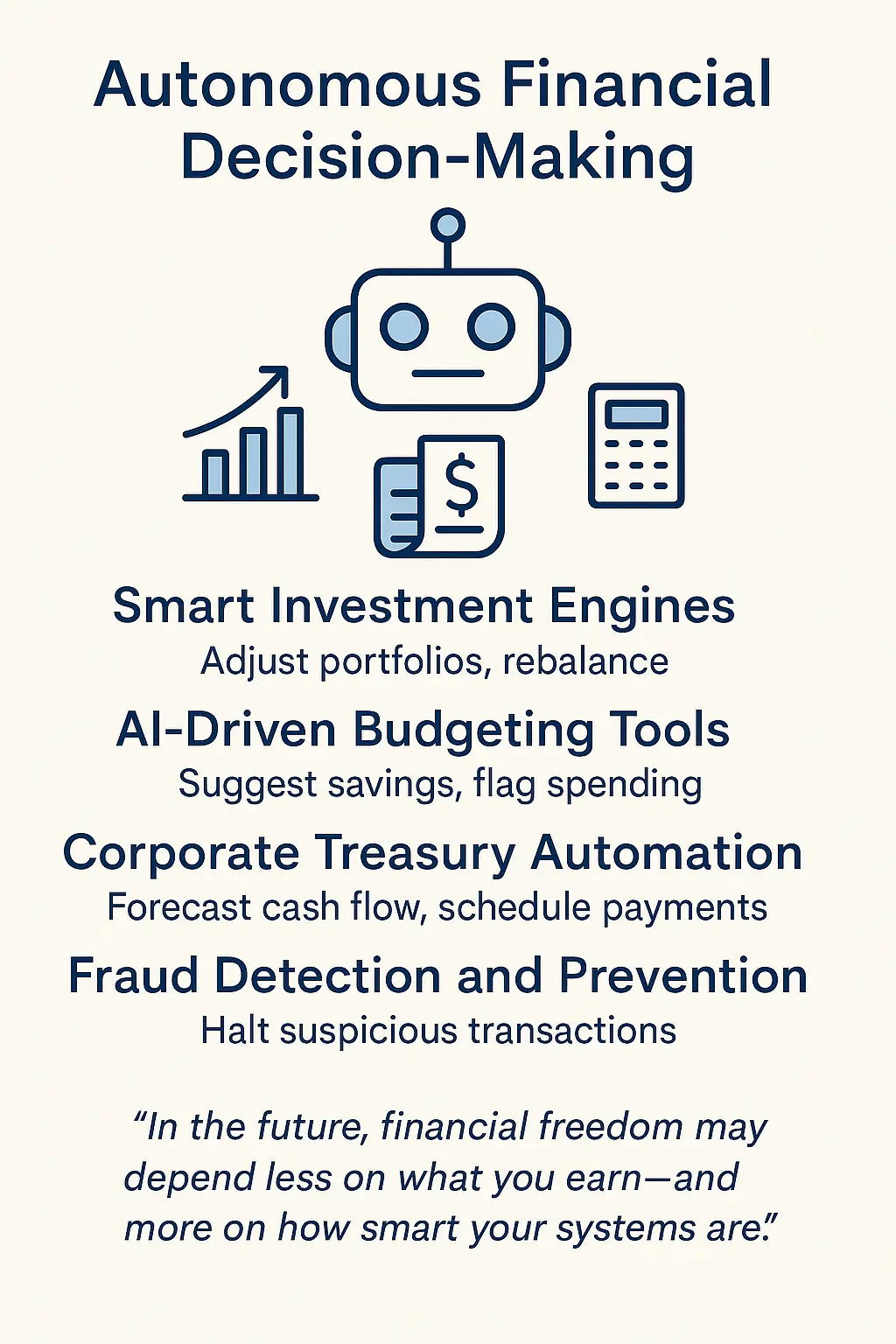💡 Autonomous Financial Decision-Making: The Dawn of Self-Driving Finance
In an age where algorithms write headlines, cars drive themselves, and AI answers questions in real time, it should come as no surprise that finance—traditionally one of the most human-driven industries—is now undergoing a seismic shift. Autonomous financial decision-making is no longer a future concept; it’s here, reshaping how individuals, institutions, and markets behave.
🚀 What Is Autonomous Financial Decision-Making?
Autonomous financial decision-making refers to the ability of AI systems or digital agents to analyze data, make financial choices, and execute actions without real-time human input. Unlike automation (which follows rules), autonomy in finance mimics human judgment—adapting to new data, learning from outcomes, and even initiating actions based on long-term goals.
Think of it as the “autopilot mode” for your money: your savings, investments, taxes, and payments can now be optimized 24/7 by intelligent systems that think and act in your best interest.
🔥 Why Now?
Several recent developments make this moment especially relevant:
- AI breakthroughs (like large language models and reinforcement learning) enable machines to understand goals, context, and nuance.
- Open finance ecosystems and APIs give machines access to real-time financial data, from bank accounts to credit histories.
- Market volatility has exposed the limits of traditional, reactive strategies—pushing institutions to seek adaptive, real-time systems.
- Rising consumer expectations demand smarter, more personalized money management without manual effort.
In short, the technological maturity + financial complexity + human fatigue equation has unlocked the perfect environment for autonomy.
🏦 Where It’s Already Happening
1. Smart Investment Engines
Platforms like Wealthfront and Betterment have introduced autonomous rebalancing, tax-loss harvesting, and goal-based investing that adjust your portfolio dynamically—no calls to your broker needed.
2. AI-Driven Budgeting Tools
Apps like Copilot, Cleo, and YNAB now use AI to automatically suggest savings amounts, flag spending anomalies, and adjust budgets to match your income changes—without user input.
3. Corporate Treasury Automation
Multinational companies are deploying agents that can forecast cash flow, schedule payments, and hedge against currency risks—all while minimizing capital drag.
4. Fraud Detection and Prevention
AI agents autonomously scan millions of transactions to detect patterns and halt fraudulent activity before a human even notices something is wrong.
💬 Real-World Implications
| Area | Autonomous Impact |
|---|---|
| 🧠 Behavioral Finance | Removes emotional bias from decisions, e.g. panic selling or impulsive spending. |
| ⏱️ Time Management | Frees up time by eliminating mundane financial tasks. |
| 📊 Market Responsiveness | Reacts instantly to data and news—faster than any human. |
| 🌍 Financial Inclusion | Offers low-cost, scalable advisory services to those without access to traditional financial professionals. |
⚠️ Risks and Guardrails
While the upsides are enormous, autonomy comes with its own set of risks:
- Over-reliance: Blind trust in automation may lead to missed nuances or anomalies that a human would catch.
- Bias in models: AI is only as fair as the data it’s trained on. Without audits, it can reinforce socioeconomic disparities.
- Lack of transparency: Autonomous systems need explainability to gain public and regulatory trust.
- Security: Autonomous agents handling transactions become high-value targets for cyberattacks.
This is why forward-thinking companies and regulators are pushing for “human-in-the-loop” designs and ethical AI policies in finance.
🧭 Looking Ahead
Imagine a future where:
- Your paycheck is automatically split between bills, savings, and investments based on real-time market and personal data.
- A digital advisor updates your financial plan after sensing an increase in rent prices in your area.
- Your company’s treasury department is run by a suite of self-optimizing agents that forecast revenue, handle compliance, and dynamically allocate capital.
That future is not 10 years away—it’s already in pilot programs and beta features across fintech, banking, and insurance.
📝 Final Thoughts
Autonomous financial decision-making isn’t about replacing humans—it’s about augmenting our capacity to make better, faster, more consistent financial choices. As complexity and velocity in the financial world continue to grow, humans alone can’t keep up. But with autonomous systems as partners, we’re stepping into a world where managing your money could be as easy—and as intelligent—as setting your navigation and letting the system drive.
“In the future, financial freedom may depend less on what you earn—and more on how smart your systems are.”

